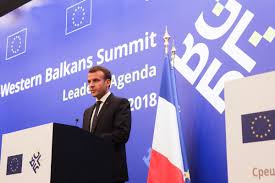Opening the EU to the Balkan countries: an historical and political challenge

The COVID-19 crisis has largely overshadowed the EU’s decision to open accession negotiations with Albania and Northern Macedonia, which has revived the prospect of a complete ‘reunification’ of the European continent. This “white smoke” owes much to the activism of the Croatian government, which currently presides over the EU Council, and was able to overcome the initial veto of Emmanuel Macron expressed in autumn 2019. The Zagreb summit, bringing together the Western Balkan countries and the EU members and institutions, has recently cemented the EU’s commitment to the region.
The fact that these moves come after Zagreb was literally hit by an earthquake should encourage us to anticipate the political “aftershocks” that will follow in many EU countries, particularly in France, the Netherlands and Denmark. Two more western Balkan countries have now joined Serbia and Montenegro in negotiating their future EU membership; the road to achieving that goal is still long and fraught with difficulties.
Two interesting anniversaries recently gave us both geopolitical and historical perspective. On 8 May, as Europeans commemorated the 75th anniversary of the end of the Second World War on their soil, we could remember that the first of these “world” wars (which were first and foremost “European” conflicts), began in the Balkans, with the assassination of Archduke Franz Ferdinand in Sarajevo. We could also remember that the armistice of 8 May 1945 not only paved the way for a period of reconstruction and reconciliation, but also led to a geopolitical division of the continent throughout the “Cold War”, of which Central Europe and the Balkans were the main victims.
In commemorating the 70th anniversary of the Schuman Declaration on 9 May, Europeans were invited to measure the virtues of a strategy of cooperation and unity which created the political and economic conditions for lasting peace in Western Europe. While the fall of the Berlin Wall enabled the reunification of Western, Central and Eastern Europe within the EU, it also created space for conflict in the Balkans, the after-effects of which are still visible.
It is now within the EU that the fate of all the countries of the western Balkans must be envisaged, following the successful accession of Slovenia and Croatia. Since the six countries remaining on our doorstep are surrounded by EU member states, it is not so much a question of “enlargement” but rather of “consolidation”. If the EU does not take the lead in the Balkans, others will do so in their own interests – be they Russian, Chinese, Turkish or even American. And since it is the road to accession that constitutes the best path for transformation, it is on this road that we must engage with the Western Balkan states, with constancy and patience.
Since this spring of 2020 is a time of commemoration, Europeans should also remember that it also marks the 15th anniversary of the French and Dutch “no” votes to the “Constitutional Treaty” – which were not unrelated to the “enlargement” of the EU.
The two “no” votes were direct rejections of the text of the “European Constitution”, but they also targeted Turkey’s planned accession to the EU, as well as the 2004 accession of 10 new member states without, perhaps, sufficient public, parliamentary or referendum debate. Many of the objections to enlargement raised then are still alive: increased economic and social competition, greater political and cultural heterogeneity in the EU, the need for greater budgetary solidarity, fears of a dilution of the EU’s deepening.
But realistically, the deepening of the EU ardently desired by France and others will not be hindered by Balkan enlargement, since the timescales are very different. And the new “enlargement methodology” proposed by the European Commission, based on a Franco-Dutch working paper, indicates that accession negotiations will henceforth be more political and reversible.
For their part, the Balkan countries must clearly demonstrate commitment to the rule of law, preservation of democratic pluralism, the fight against corruption, and the suppression of organised crime. The European Commission has indicated that the progress made on these issues so far has been significant enough to justify the opening of accession negotiations: but more will still be needed to improve the situation in the candidate countries and their image in the EU Member States.
Finally, extensive information and awareness-raising activities will have to be undertaken in the most “Balkan-sceptical” EU countries throughout the accession negotiations and prior to their ratification. This is all the more necessary since the recent decision to open negotiations with Albania and Northern Macedonia has not been the subject of any political after-sales service. We may even face new referendums – for example, France indeed requires that future EU members be approved by a popular vote, unless the French Parliament ratifies the accession treaties by a 3/5 majority.
The route ahead is tough, but clear. Consistency, patience and persuasion are now required – from both sides, the EU and the Balkan countries.